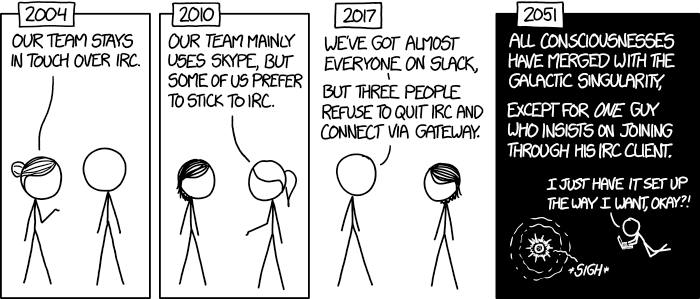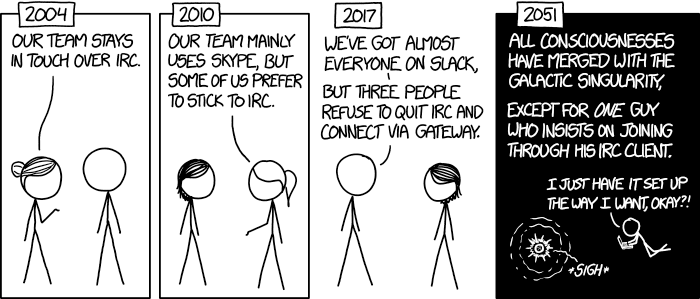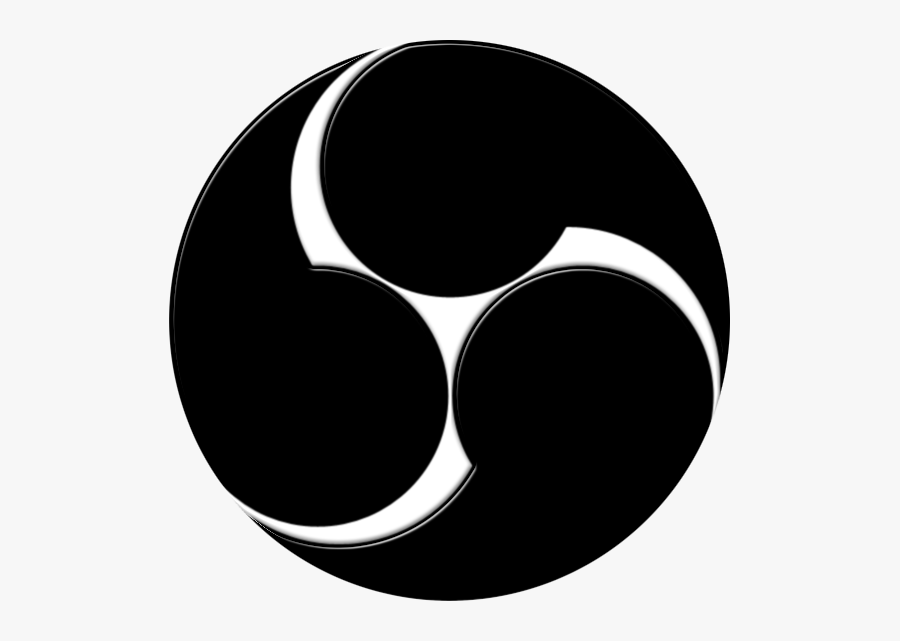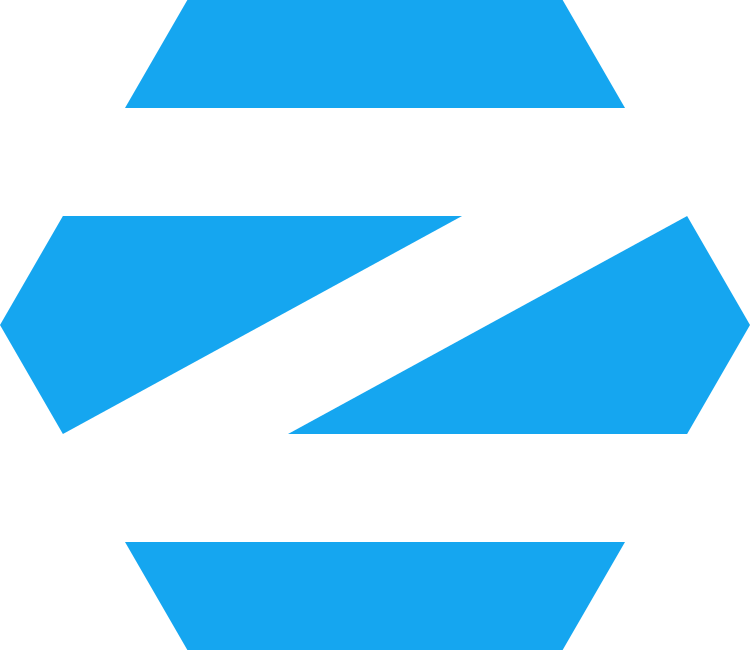Free collaborative messaging for the masses
Email is not an organizing or collaboration tool. Chances are if you use your email inbox as a to do list, for task/project management, as a reading list, calendar, and who knows what else, then you may be missing some Metaviews newsletters.
Today’s Future Tools is self-serving, in that we want to let you know that email cannot and should not do everything. Email is for things like newsletters, and messages, not all the other tasks we keep trying to use it for. Your inbox should be relatively empty, so you can read Metaviews each weekday morning!
The rise of email glut and overload is partly why Slack has risen to become a powerful tool, within both large enterprises, but also collaborative social or knowledge networks.
In order to understand the value and role of today’s future tool, riot, we need to start off by looking at Slack. What it is, and why people use it.
In the above promotional video, Slack claims to be replacing email. Tragically that is a bit of an over reach, but it does reveal the company’s ambitions.
In an era of data mining and harvesting, Slack is hungry for the data in the enterprise. To get at this data they’ve leveraged the ease of chat (or instant messaging), with the desire to get what Gmail already has: the intimate data found in our messages. They do this by finding shared purpose with the executives of contemporary enterprises, who also have a desire to get at the data their company generates.
A primary selling point behind Slack’s vision off collaboration, is to get people out of their private email inboxes, and instead use shared spaces to gather and organize information, so that everyone is on the same digital page.
This has been a successful proposition, and Slack has blazed the trail for organizational collaboration. On the surface, Slack is just a chat app, yet in reality it is far more. It combines apps, search, and fosters a kind of collective memory that has driven the company’s success, and the growing number of users who see Slack as a more productive alternative to email.
Before @Dropbox, you had to fuss with zip attachments.
— Simon Lau (@_SimonLau) November 29, 2019
Before @SlackHQ, you had to deal with unwieldy email threads.
Before @Zoom_us, you had to settle for choppy, laggy video calls.
Before @Otter_ai, you had to take notes and still miss something.#AIhttps://t.co/SmKa293Kv0
(Note to collective self, when we get the Metaviews podcast up and running, check out Otter voice for transcription.)
However in the technology world, just because you blazed the trail, doesn’t mean you get to keep it. Microsoft has taught that lesson to many companies before Slack came along.
Slack slides nearly 6% in early trading after Microsoft says its Teams app has 20M users, more than Slack's current 12M, https://t.co/F4Zs2CaUMG pic.twitter.com/LYaWToRuxQ
— CNBC Now (@CNBCnow) November 19, 2019
Slack is accusing Microsoft of ripping off its ads. This is in the same week Microsoft revealed it has 20 million Teams users. Slack even hit Microsoft with the "ok boomer" meme. Ouch. Details: https://t.co/7ec9N85TJd pic.twitter.com/3WnbNAlc3Z
— Tom Warren (@tomwarren) November 21, 2019
ok boomer pic.twitter.com/NB617NDFLV
— Slack (@SlackHQ) November 21, 2019
I’ve used Slack for a number of years, mostly as a way to quickly understand and integrate with corporate partners or public sector organizations.
When I was a resident of the IBM Innovation Space in Toronto, everything was done via Slack, from reserving meeting rooms, to celebrating when a fellow resident found success. I’ve participated in a few book clubs via Slack, open source projects, and University based research networks. I’ve also recently joined a Slack for the Canada School of Public Service Digital Academy, of which I’m a fellow, and it’s been a great way to learn about the Academy and be part of their ongoing events and initiatives.
While Slack is relatively straight forward to use, I don’t believe it lives up to the hype. Yes, it is useful to have an app like this, in addition to email, to help with collaboration, and to create a shared space. However it neither offers a unique experience, nor is it worth giving up all this data to Slack.
As with many of these tools, a primary advantage of Slack is that a whole lot of other people are using it. You often don’t need to convince people to download a new app, you just have them connect to your server on Slack, which, if they work (or have worked) in an enterprise, then they’ve already got it.
That’s where Riot comes in. A decentralized, encrypted chat and collaboration tool, Riot is “powered” by Matrix, an open source project that has created an open standard for secure, real-time communication and organizing.
In some respects, Riot is better than Slack because it offers many of the same features, without having to give up or compromise your data.
We are spending more and more time in @matrixdotorg. @RiotChat works like a charm, better than @SlackHQ for many things and of course way better than IRC. It's awesome to have so many open communities forming and being able to jump from one channel to the other. Give it a try! 📢 pic.twitter.com/5uL1D4ryQo
— poliastro (@poliastro_py) March 5, 2019
Riot has apps available for your browser, desktop, android or iOS device. As well, because it is free and open source there are no restrictions on how it is used, and it can even be repurposed and renamed for organizational use, as long as proper credit is given.
Happy to be the trendy and secure alternative to Skype! Thanks @zdnetfr ! https://t.co/Uc6WuRK1VF Riot is also the basis for @tchap_dinsic rolled out by the french government. pic.twitter.com/BbrSwkQrqK
— Element (@element_hq) October 2, 2019
Vive le France! This is where we could make a joke about how the French like to riot, but more importantly, oh how the French love their free and open source software. This is a great example of the public sector creating public infrastructure using tools that are freely available, yet lack popular support and backing. Bravo to the French government for demonstrating this kind of public leadership.
The French State creates its own secure instant messenger
— Matthijs Pontier 💜🏴☠️ (@Matthijs85) November 25, 2019
with Matrix and Riot as basis 👌 https://t.co/9XSX2nG9dV
This should be an example for other governments! #security #privacy @eoverheid pic.twitter.com/9bs1FH0M3p
The backing of the French state is not the only thing making Riot and Matrix a growing alternative. They’ve also recently received funding to help build the larger ecosystem that sustains a platform like this.
Massive news for the Matrix ecosystem today: New Vector has raised an additional $8.5M of funding in order to speed up Riot/Matrix development and expand Matrix hosting via https://t.co/UhAjLqiMQc!https://t.co/j7tCL7Luex pic.twitter.com/6yop2KIzcI
— AlternativeTo (@AlternativeTo) October 11, 2019
Matrix will benefit from the ongoing success of Slack and Skype (a/k/a Microsoft Teams). As more people seek out alternatives to the basic features of email, collaboration and communication platforms grow in value. As a secure and open source platform, Matrix has considerable room to grow, and it will be interesting to see how it is used and why.
To be clear, Riot is the foreground, and Matrix is the background. Today’s issue was about Riot, via Slack, with a glimpse into the Matrix.
As a much larger project, or framework, Matrix has interesting ambitions, that are evoked in this video they made a few years ago for hackathon participants:




